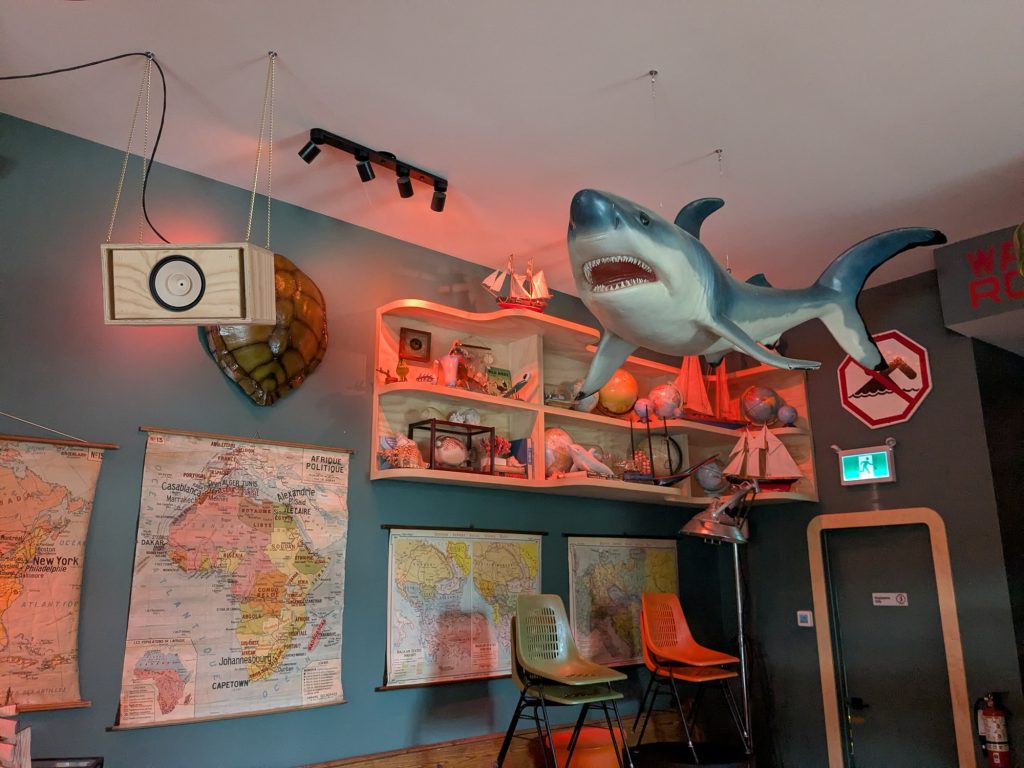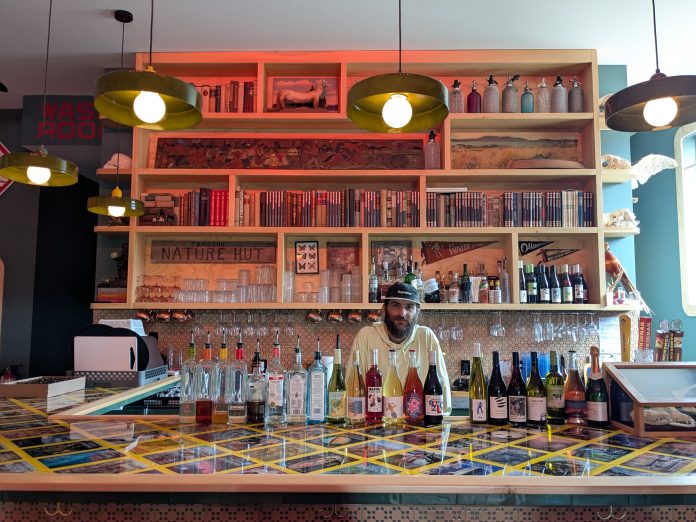A giant bear statue named Kevin, a shark hanging from the ceiling, and shelves of other wilderness creatures are there to greet you after stepping inside Somerset Street’s Natural History bar.
If you had too many to drink, perhaps you would think you were out for a night at the museum or visiting a scientific lab. It’s a strange but wonderful experience.
The rather distinctive drinking hole, full of taxidermy and other artifacts, was opened by Max Anisman, who’s no stranger to the community. The 38-year-old also runs Ward 14, a bar and consignment shop on Preston Street, which also has a peculiar look as if it came out of Netflix’s hit tv show Riverdale.
“I had Ward 14 for a long time, and the plan was maybe to move it…but nobody wanted to disturb a good thing. So I sat on it a bit, and renovated the apartment upstairs,” said Anisman. Then came the Somerset space.
Almost everything in Natural History has a personal connection to Anisman, whose immediate family are no strangers to the world of business. Remember Mrs. Tiggy Winkles? It was owned by the bar owner’s mother, Maida Anisman. As for his brother Simon, he runs a gift shop and vintage store called Hokum in the former toy lovers’ Bank Street space.
But the connection goes even further back. The late Ann and Ralph Silverstone, Anisman’s maternal grandparents, ran an antique shop in Montreal. And during that time they collected a lot of historic items that were displayed in “museums” his grandfather had put together.
“My grandfather built all these little cabins in the woods. They were nature people. He also built tons of model airplanes,” said Anisman as he flipped through old photos. “These books were my grandfather’s,” he said, pointing to the wall, as were “the taxidermy, and a lot of the other bric-a-brac.”

While describing it all, Anisman’s focus shifts to the many walls of Natural History, which are layered in a myriad of collectibles — maps and globes, ocean shells and ships in bottles, framed butterflies and moths, and the previously mentioned books, which he has placed on shelves above the bar.
“The books are actually amazing. They were ordered by mail, part of a club, and they’re stuck back there,” said Anisman. “I don’t want people really going through them all that much. And they shine, not because they’re gold, but because they’re from when they used to make books a little bit more carefully.”
A quick browsing of the shelves offers titles like The Imperial Collection of Audubon Animals, or The Last Days of Pompeii, alongside authors like Herman Melville and Rudyard Kipling.
In addition to the collection of books, Anisman has decorated the bar in dozens of National Geographic magazine covers dating back to the 1970s. Layered under a protective glass cover, a person could easily get lost in the iconic images.
Even the sign above the bathroom has a deep meaning. The letters are from the former Wah-Shing grocery store, which predated the now drinking hole for over 40 years.
“I left everything I could because I like the rusted out metal,“ said Anisman.
The bar has plans to expand. It’s currently working on a food menu and wants to host events. That could include DJ nights and music nights for the young and hip, or spelling bees instead of trivia nights for the inner nerds.
The history of 835 Somerset St.
If only walls could talk, the property at 835 Somerset Street in Ottawa’s Chinatown neighbourhood would have countless stories to tell. Its original structures were built in the late 1800s and were razed to the ground not once, but twice in a very short time.
First came the Great Fire of 1900, caused by a defective chimney in Hull. The fire decimated the City of Hull, sending embers across the river to Ottawa’s west end and destroying almost one fifth of Ottawa, from Lebreton Flats to Dow’s Lake – including any structures at the 835 property.
Then, just three years later, the 1903 West End fire burned through the area encompassed by Preston Street, Albert Street, and Booth Street to just south of Gladstone Avenue.
Directory Archives from the City of Ottawa detail the property at the intersection of Somerset Street W and Rochester Street in 1903 as being “fire swept.” It wasn’t until 1910 that a name and business was registered to the property again.
J.M. Guenette, a barber, had set up shop at 835 Somerset W with the adjacent address of 833 housing Richer & McGuire Real Estate, as well as a pool Hall/room belonging to Anthime Richer.
The building would go on to house an assortment of businesses and events for the next half century – the aforementioned barber shops and pool halls, as well as athletic clubs, and was even regularly used in the early 1900s as polling stations for municipal, provincial, and federal government elections.
However, there was also an illicit side of things to the legally registered establishments. It seems J. M. Guenette’s son, Jean Baptiste, wasn’t content with simply cutting hair.
The Ottawa Journal, in a number of articles dating from February 1936 to June 1937, reported gaming charges being laid against the proprietors for running poker tables – not only a socially taboo endeavour, but an illegal one at the time. On June 16, 1937, Guenette, along with a handful of others, was sentenced to a month in jail for “keeping common gaming houses.”
The property also has ties to another significant part of history. On June 6th, 1944, a young Canadian soldier by the name of Antonio Ladas, a resident of 835 Somerset W, died in the Allied attack on the beaches of Normandy, France. The Ottawa Journal reported in August a message from George Drew, Premier of Ontario, to the family expressing “deep sympathy in the loss of your dear son.”
In 1981, after years of ping-ponging between pool hall or billiard club owners, the Somerset storefront became the Wah-Shing Grocery Store.
For 40 plus years, it offered everything from fresh fruit to household essentials and traditional Chinese ceremonial clothing. A staple of the neighbourhood, it was memorialised by Colin White, a local artist, in one of his prints in the summer of 2017.
Sadly, Wah-Shing closed its doors not long after the pandemic arrived. The family-owned business had seen the retirement of the original owners a few years previous, and like many local businesses, struggled to remain profitable once COVID-19 hit.
